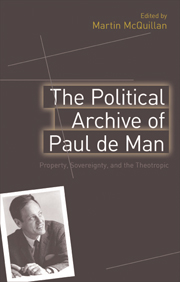Book contents
- Frontmatter
- Contents
- List of Abbreviations
- Acknowledgements
- Notes on Contributors
- Introduction: Broken Promises: Rousseau, de Man and Watergate
- 1 Lovence in Rousseau's Julie ou la Nouvelle Héloïse
- 2 Reading Spectacles in Rousseau's Letter to d'Alembert
- 3 The Utter Misery of the Human Mind: Apotropaic and Theotropic in de Man's Rousseau
- 4 Rhetoric and Rausch: de Man on Nietzsche on Value and Style
- 5 Theotropic Logology: J. Hillis Miller, Paul de Man and Kenneth Burke
- 6 Normativity, Materiality and Inequality: The Politics of the Letter in Paul de Man
- 7 Inscribing the Political: Paul de Man and the Wild Art of Letter Writing
- 8 Mistake in Paul de Man: Violent Reading and Theotropic Violence
- 9 Lightstruck: ‘Hegel on the Sublime’
- 10 De Man vs. ‘Deconstruction’: or, Who, Today, Speaks for the Anthropocene?
- 11 Paul de Man at Work: What Good is an Archive?
- 12 DNA: de Man's Nucleic Archive
- 13 Sovereign Debt Crisis: Paul de Man and the Privatization of Thought
- Appendix: Nietzsche I: Rhetoric + Metaphysics
- Index
Appendix: Nietzsche I: Rhetoric + Metaphysics
Published online by Cambridge University Press: 05 August 2013
- Frontmatter
- Contents
- List of Abbreviations
- Acknowledgements
- Notes on Contributors
- Introduction: Broken Promises: Rousseau, de Man and Watergate
- 1 Lovence in Rousseau's Julie ou la Nouvelle Héloïse
- 2 Reading Spectacles in Rousseau's Letter to d'Alembert
- 3 The Utter Misery of the Human Mind: Apotropaic and Theotropic in de Man's Rousseau
- 4 Rhetoric and Rausch: de Man on Nietzsche on Value and Style
- 5 Theotropic Logology: J. Hillis Miller, Paul de Man and Kenneth Burke
- 6 Normativity, Materiality and Inequality: The Politics of the Letter in Paul de Man
- 7 Inscribing the Political: Paul de Man and the Wild Art of Letter Writing
- 8 Mistake in Paul de Man: Violent Reading and Theotropic Violence
- 9 Lightstruck: ‘Hegel on the Sublime’
- 10 De Man vs. ‘Deconstruction’: or, Who, Today, Speaks for the Anthropocene?
- 11 Paul de Man at Work: What Good is an Archive?
- 12 DNA: de Man's Nucleic Archive
- 13 Sovereign Debt Crisis: Paul de Man and the Privatization of Thought
- Appendix: Nietzsche I: Rhetoric + Metaphysics
- Index
Summary
Several Nietzsche commentators have pointed out that Nietzsche's valorization of the critical, deconstructive processes that occupy such a prominent place in his work is ambivalent. In Ironie und Dichtung, Beda Alleman describes the seductive dangers of Nietzschean deconstruction as follows: ‘Es eröffnet sich hier (in the psychological demystification of Human all too Human) eine hervorragende Möglichkeit der Ironie, die ein angemessenes Spielfeld findet in der Spannung zwischen ‘Illusion’ und deren Auflösung, im aphoristischen Umschlag aus dem allgemein Geglaubten in eine geistreiche Enthüllung und in der Widerlegung des scheinbar allgemein Gültigen durch ein scheinbar noch allgemeiner Gültiges: der konventionell übernommenen Meinung durch die zum vornherein eigentlich feststehende verächtliche Absichtlichkeit aller menschlichen Meinungen.’ (I+D., 114) (m.i.) He goes on to comment that the a priori distrustful attitude towards human motives is too facile, too cheap an attitude to achieve philosophical dignity and he quotes Nietzsche's own derogatory remarks against ‘Die Art Seelenaushorchung und – Ausschnüffelung’ which he despises in Renan and in Sainte-Beuve. The attitude allows, at best, for flashes of wit – Alleman alludes to Lichtenberg and to French ‘moralists’ such as, presumably, la Rochefoucauld or Chamfort – but Nietzsche's own authority can be enlisted in condemning it as ‘tief Unvornehm’ despite its ‘vornehmer Anschein’, as ‘blasiert’, devoid of ‘echterer Adel’, in short, as a manifestation of the ‘weak’ nihilism that is consistently being condemned throughout the work.
- Type
- Chapter
- Information
- The Political Archive of Paul de ManProperty, Sovereignty and the Theotropic, pp. 179 - 192Publisher: Edinburgh University PressPrint publication year: 2012

